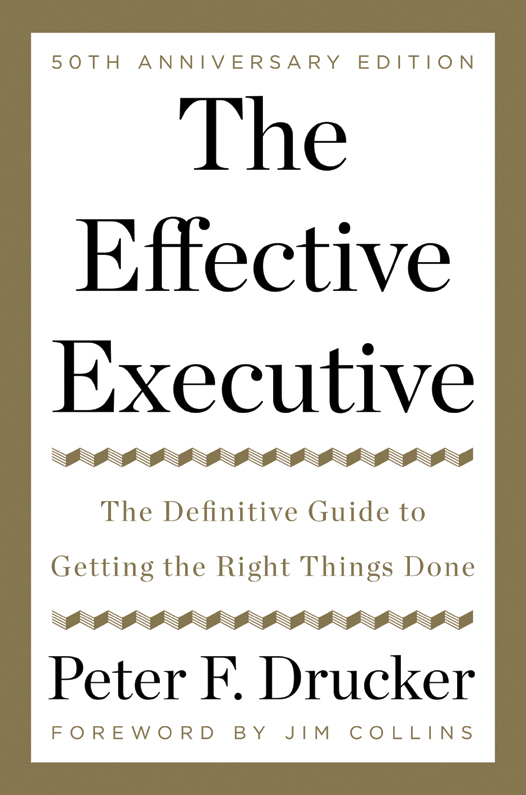The Effective Executive - Peter F. Drucker

## Metadata
- Author: **Peter F. Drucker**
- Full Title: The Effective Executive
- Category: #books
## Highlights
- *1: First, manage thyself.*
“That one can truly manage other people is by no means adequately proven,” Drucker writes. “But one can always manage oneself.” How can you possibly expect others to perform at the highest levels without first expecting that of yourself? Drucker lays out a law of organized performance: The ratio of a leader’s performance to those on his or her team remains constant; therefore, if you want the average performance of those around you to go up, you must first improve your own performance.
*#2: Do what you’re made for.*
One of Drucker’s most arresting points is that we are all incompetent at most things. The crucial question is not how to turn incompetence into excellence, but to ask, “What can a person do uncommonly well?” This leads, inevitably, to a conclusion: Your first responsibility is to determine your *own* distinctive competences—what *you* can do uncommonly well, what *you* are truly made for—and then navigate your life and career in direct alignment. “To focus on weakness is not only foolish; it is irresponsible,” challenges Drucker. ([View Highlight](https://read.readwise.io/read/01k4x4pjhbfz2vsq18eg4ffc6n))
- When Michael Jordan was reaching the end of his basketball career, he could no longer fly to the basket with the same height and power as when he was younger, so he began to build a strength he’d never previously had: a fadeaway jumper. He eradicated a crucial weakness within his strength, turning his fadeaway jumper into yet another Jordan-can-kill-you strength on the court. Do what you’re made for, yes, but then get better and better; eradicate weakness, yes, *but only* within strength.
*#3: Work how you work best (and let others do the same).*
If you’re a tool put here on this earth to be useful, how does the tool work best? Some people work well at night; others work better in the morning. Some absorb information best by reading, others by listening. Some thrive in full immersion; others work better in short bursts with variety in the day. Some are project oriented; others are process oriented. Some need vacations; others think the best part about vacations is that they end. Some prefer teams, whereas others produce much greater impact working alone. Per Drucker, we are wired for ways of working in the same way we are right-handed or left-handed. I discovered early that I cannot exchange morning creative hours for afternoon creative hours (the morning ones are always better). Drucker gave me the confidence to calendar white space in the morning and to be belligerently reclusive during creative hours. No one but you can take responsibility to leverage how you best work, and the sooner you do, the more years you have to gain the cumulative effect of tens of thousands of hours well spent. ([View Highlight](https://read.readwise.io/read/01k4x4tdjs60jhzyvw3yspm2g4))
- Effective executives, in my observation, do not start with their tasks. They start with their time. And they do not start out with planning. They start by finding out where their time actually goes. Then they attempt to manage their time and to cut back unproductive demands on their time. Finally they consolidate their “discretionary” time into the largest possible continuing units. This three-step process:
• recording time,
• managing time, and
• consolidating time is the foundation of executive effectiveness. ([View Highlight](https://read.readwise.io/read/01k56rw1t4wtd0tm3pb32zdwf4))
- Meetings are by definition a concession to deficient organization for one either meets or one works. One cannot do both at the same time. In an ideally designed structure (which in a changing world is of course only a dream) there would be no meetings. Everybody would know what he needs to know to do his job. Everyone would have the resources available to him to do his job. We meet because people holding different jobs have to cooperate to get a specific task done. We meet because the knowledge and experience needed in a specific situation are not available in one head, but have to be pieced together out of the experience and knowledge of several people. ([View Highlight](https://read.readwise.io/read/01k56wrrbajgp3jt13ncennnqa))